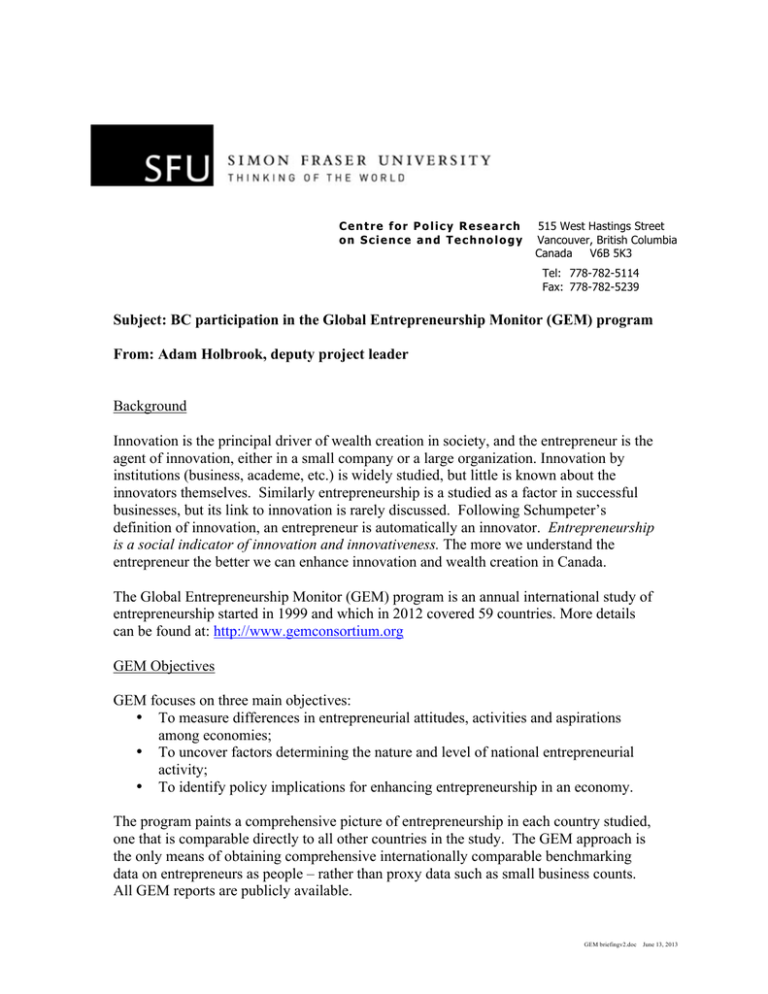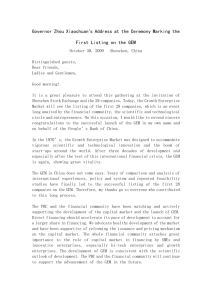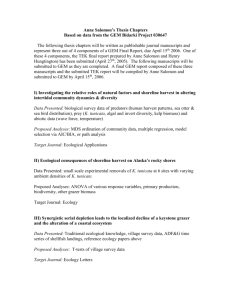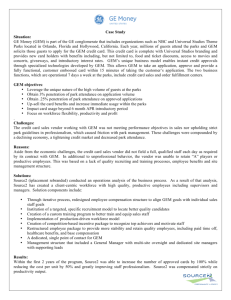Subject: BC participation in the Global Entrepreneurship Monitor (GEM) program
advertisement

Centre for Policy Research on Science and Technology 515 West Hastings Street Vancouver, British Columbia Canada V6B 5K3 Tel: 778-782-5114 Fax: 778-782-5239 Subject: BC participation in the Global Entrepreneurship Monitor (GEM) program From: Adam Holbrook, deputy project leader Background Innovation is the principal driver of wealth creation in society, and the entrepreneur is the agent of innovation, either in a small company or a large organization. Innovation by institutions (business, academe, etc.) is widely studied, but little is known about the innovators themselves. Similarly entrepreneurship is a studied as a factor in successful businesses, but its link to innovation is rarely discussed. Following Schumpeter’s definition of innovation, an entrepreneur is automatically an innovator. Entrepreneurship is a social indicator of innovation and innovativeness. The more we understand the entrepreneur the better we can enhance innovation and wealth creation in Canada. The Global Entrepreneurship Monitor (GEM) program is an annual international study of entrepreneurship started in 1999 and which in 2012 covered 59 countries. More details can be found at: http://www.gemconsortium.org GEM Objectives GEM focuses on three main objectives: • To measure differences in entrepreneurial attitudes, activities and aspirations among economies; • To uncover factors determining the nature and level of national entrepreneurial activity; • To identify policy implications for enhancing entrepreneurship in an economy. The program paints a comprehensive picture of entrepreneurship in each country studied, one that is comparable directly to all other countries in the study. The GEM approach is the only means of obtaining comprehensive internationally comparable benchmarking data on entrepreneurs as people – rather than proxy data such as small business counts. All GEM reports are publicly available. GEM briefingv2.doc June 13, 2013 Page 2 of 3 The GEM methodology produces results on entrepreneurship that are comparable across numerous countries. Each national program must follow the methodology rigorously to ensure comparability. The methodology has three parts: • An adult population survey (APS), a minimum 2000 interviews per country, carried out by telephone, with approximately 40 questions, with more for specific sub-groups such as technology companies; as well as the core questions there are also each year mandatory and optional add-on modules; • Interviews with experts across the country (national experts survey – NES); • A statistical study that assembles available data. GEM 2013 GEM 2013 already has committed funding for the study at the national level. Some provinces – Alberta, BC, Manitoba, Newfoundland, Ontario, Quebec and Saskatchewan have also committed funding for oversampling to enable provincial comparisons with the results from the international program and get statistically meaningful results for the APS and NES within that province. The number of additional interviews needed for each province depends on its population. There will be a detailed GEM Report for Canada and one for each participating province. This will be a three year (minimum) program. The Centre for Innovation Studies (THECIS) in Calgary will be the overall manager of the Canadian project (please see www.thecis.ca). Benefits A better knowledge of entrepreneurship across Canada will allow policy makers and support organizations to better target their programs, identify gaps and opportunities and monitor progress year over year. The value comes from a multi-year involvement which permits tracking trends over time. Canada last participated in 2003, and was the only G8 country not included in 2012. GEM can provide data that differentiates entrepreneurs on the basis age, education, income, whether stating a business opportunistically, or out of need, the broad sector and whether the product or service is new to the local market. Existing data from GEM has/will provide data on “intrapreneurs” (those working in larger firms), networking (the nature of teams launching small businesses) and innovation. The Centre for Policy Research on Science and Technology (CPROST) at Simon Fraser University is a participant in the national project. A clear area of interest to CPROST is comparisons between the Canadian and BC economies and the economies of other Pacific Rim nations. Page 3 of 3 An example of the analysis A good example of the power of the data collection and analysis program can be seen below. The data are from the 2011 GEM project in the Caribbean region (the % figures are the percentages of the total respondents to the APS):






![32] laudato si - St. Francis Xavier Church , Panvel](http://s2.studylib.net/store/data/010185794_1-e4a400ade03433d1da3a670658ed280b-300x300.png)

